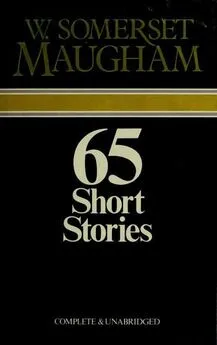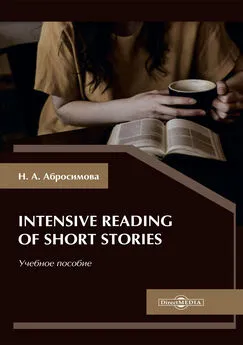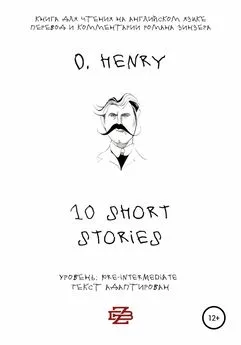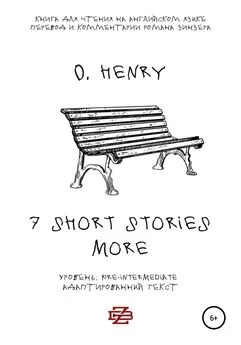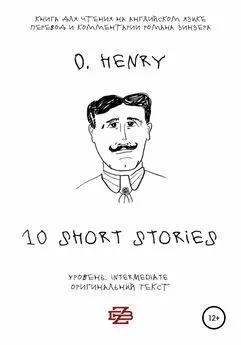Somerset Maugham - Sixty-Five Short Stories
- Название:Sixty-Five Short Stories
- Автор:
- Жанр:
- Издательство:неизвестно
- Год:неизвестен
- ISBN:нет данных
- Рейтинг:
- Избранное:Добавить в избранное
-
Отзывы:
-
Ваша оценка:
Somerset Maugham - Sixty-Five Short Stories краткое содержание
Sixty-Five Short Stories - читать онлайн бесплатно полную версию (весь текст целиком)
Интервал:
Закладка:
'Well, my lad, have you shaved today?'
Neil passed his hand over his chin.
'No, d'you think I need it?'
The Captain always laughed at this.
'Need it? Why, you've got a face like a baby's bottom.'
And invariably Neil reddened to the roots of his hair.
'I shave once a week,' he retorted.
But it wasn't only his looks that made you like him. It was his ingenuousness, his candour, and the freshness with which he confronted the world. For all his intentness and the solemn way in which he took everything, and his inclination to argue upon every point that came up, there was something strangely simple in him that gave you quite an odd feeling. The Captain couldn't make it out.
'I wonder if it's because he's never had a woman,' he said to himself. 'Funny. I should have thought the girls never left him alone. With a complexion like that.'
But the Sultan Ahmed was nearing the bend after rounding which Kuala Solor would be in sight and the Captain's reflections were interrupted by the necessities of his work. He rang down to the engine room. The ship slackened to half speed. Kuala Solor straggled along the left bank of the river, a white, neat, and trim little town, and on the right on a hill were the fort and the Sultan's palace. There was a breeze and the Sultan's flag, at the top of a tall staff, waved bravely against the sky. They anchored in mid-stream. The doctor and a police officer came on board in the government launch. They were accompanied by a tall thin man in white ducks. The Captain stood at the head of the gangway and shook hands with them. Then he turned to the last comer.
'Well, I've brought you your young hopeful safe and sound.' And a glance at Neil: 'This is Munro.'
The tall thin man held out his hand and gave Neil an appraising look. Neil flushed a little and smiled. He had beautiful teeth.
'How do you do, sir?'
Munro did not smile with his lips, but faintly with his grey eyes. His cheeks were hollow and he had a thin aquiline nose and pale lips. He was deeply sunburned. His face looked tired, but his expression was very gentle, and Neil immediately felt confidence in him. The Captain introduced him to the doctor and the policeman and suggested that they should have a drink. When they sat down and the boy brought bottles of beer Munro took off his topee. Neil saw that he had close-cropped brown hair turning grey. He was a man of forty, quiet, self-possessed in manner, with an intellectual air that distinguished him from the brisk little doctor and the heavy swaggering police officer.
'MacAdam doesn't drink,' said the Captain when the boy poured out four glasses of beer.'
'All the better,' said Munro. 'I hope you haven't been trying to lure him into evil ways.'
'I tried to in Singapore,' returned the Captain, with a twinkle in his eyes, 'but there was nothing doing.'
When he had finished his beer Munro turned to Neil.
'Well, we'll be getting ashore, shall we?'
Neil's baggage was put in charge of Munro's boy and the two men got into a sampan. They landed.
'Do you want to go straight up to the bungalow or would you like to have a look round first? We've got a couple of hours before tiffin.'
'Couldn't we go to the museum?' said Neil.
Munro's eyes smiled gently. He was pleased. Neil was shy and Munro not by nature talkative, so they walked in silence. By the river were the native huts, and here, living their immemorial lives, dwelt the Malays. They were busy, but without haste, and you were conscious of a happy, normal activity. There was a sense of the rhythm of life of which the pattern was birth and death, love, and the affairs common to mankind. They came to the bazaars, narrow streets with arcades, where the teeming Chinese, working and eating, noisily talking, as is their way, indefatigably strove with eternity.
'It's not much after Singapore,' said Munro, 'but I always think it's rather picturesque.'
He spoke with an accent less broad than Neil's but the Scots burr was there and it put Neil at his ease. He could never quite get it out of his head that the English of English people was affected.
The museum was a handsome stone building and as they entered its portals Munro instinctively straightened himself. The attendant at the door saluted and Munro spoke to him in Malay, evidently explaining who Neil was, for the attendant gave him a smile and saluted again. It was cool in there in comparison with the heat without and the light was pleasant after the glare of the street.
'I'm afraid you'll be disappointed,' said Munro. 'We haven't got half the things we ought to have, but up to now we've been handicapped by lack of money. We've had to do the best we could. So you must make allowances.'
Neil stepped in like a swimmer diving confidently into a summer sea. The specimens were admirably arranged. Munro had sought to please as well as to instruct, and birds and beasts and reptiles were presented, as far as possible in their natural surroundings, in such a way as to give a vivid impression of life. Neil lost his shyness and began with boyish enthusiasm to talk of this and that. He asked an infinity of questions. He was excited. Neither of them was conscious of the passage of time, and when Munro glanced at his watch he was surprised to see what the hour was. They got into rickshaws and drove to the bungalow.
Munro led the young man into a drawing-room. A woman was lying on a sofa reading a book and as they came in she slowly rose.
'This is my wife. I'm afraid we're dreadfully late, Darya.'
'What does it matter?' she smiled. 'What is more unimportant than time?'
She held out her hand, a rather large hand, to Neil and gave him a long, reflective, but friendly look.
'I suppose you've been showing him the museum.'
She was a woman of five-and-thirty, of medium height, with a pale brown face of a uniform colour and pale blue eyes. Her hair, parted in the middle and wound into a knot on the nape of her neck, was untidy; it had a moth-like quality and was of a curious pale brown. Her face was broad, with high cheekbones, and she had a rather fleshy nose. She was not a pretty woman, but there was in her slow movements a sensual grace and in her manner as it were a physical casualness that only very dull people could have failed to find interesting. She wore a frock of green cotton. She spoke English perfectly, but with a slight accent.
They sat down to tiffin. Neil was overcome once more with shyness, but Darya did not seem to notice it. She talked freely and easily. She asked him about his journey and what he had thought of Singapore. She told him about the people he would have to meet. That afternoon Munro was to take him to call on the Resident, the Sultan being away, and later they would go to the club. There he would see everybody.
'You will be popular,' she said, her pale blue eyes resting on him with attention. A man less ingenuous than Neil might have noticed that she took stock of his size and youthful virility, his shiny curling hair and his lovely skin. 'They don't think much of us.'
'Oh, nonsense, Darya. You're too sensitive. They're English, that's all.'
'They think it's rather funny of Angus to be a scientist and they think it's rather vulgar of me to be a Russian. I don't care. They're fools. They're the most commonplace, the most narrow-minded, the most conventional people it has ever been my misfortune to live amongst.'
'Don't put MacAdam off the moment he arrives. He'll find them kind and hospitable.'
'What is your first name?' she asked the boy.
'Neil.'
'I shall call you by it. And you must call me Darya. I hate being called Mrs Munro. It makes me feel like a minister's wife.'
Neil blushed. He was embarrassed that she should ask him so soon to be so familiar. She went on.
'Some of the men are not bad.'
'They do their job competently and that's what they're here for,' said Munro.
'They shoot. They play football and tennis and cricket. I get on with them quite well. The women are intolerable. They are jealous and spiteful and lazy. They can talk of nothing. If you introduce an intellectual subject they look down their noses as though you were indecent. What can they talk about now? They're interested in nothing. If you speak of the body they think you improper, and if you speak of the soul they think you priggish.'
'You mustn't take what my wife says too literally,' smiled Munro, in his gentle, tolerant way. 'The community here is just like any other in the East, neither very clever, nor very stupid, but amiable and kindly. And that's a good deal.'
'I don't want people to be amiable and kindly. I want them to be vital and passionate. I want them to be interested in mankind. I want them to attach more importance to the things of the spirit than to a gin pahit or a curry tiffin. I want art to matter to them, and literature.' She addressed herself abruptly to Neil: 'Have you got a soul?'
'Oh, I don't know. I don't know exactly what you mean.'
'Why do you blush when I ask you? Why should you be ashamed of your soul? It is what is important in you. Tell me about it. I am interested in you and I want to know.'
It seemed very awkward to Neil to be tackled in this way by a perfect stranger. He had never met anyone like this. But he was a serious young man and when he was asked a question straight out he did his best to answer it. It was Munro's presence that embarrassed him.
'I don't know what you mean by the soul. If you mean an immaterial or spiritual entity, separately produced by the creator, in temporary conjunction with the material body, then my answer is in the negative. It seems to me that such a radically dualistic view of human personality cannot be defended by anyone who is able to take a calm view of the evidence. If, on the other hand, you mean by soul the aggregate of psychic elements which form what we know as the personality of the individual, then, of course, I have.'
'You're very sweet and you're wonderfully handsome,' she said, smiling. 'No, I mean the heart with its longings and the body with its desires and the infinite in us. Tell me, what did you read on the journey, or did you only play deck tennis?'
Neil was taken aback at the inconsequence of her reply. He would have been a little affronted except for the good-humour in her eyes and the naturalness in her manner. Munro smiled quietly at the young man's bewilderment, when he smiled the lines that ran from the wings of his nostrils to the corners of his mouth became deep furrows.
'I read a lot of Conrad.'
'For pleasure or to improve your mind?'
'Both. I admire him awfully.'
Darya threw up her arms in an extravagant gesture of protest.
'That Pole,' she cried. 'How can you English ever have let yourselves be taken in by that wordy mountebank? He was all the superficiality of his countrymen. That stream of words, those involved sentences, the showy rhetoric, that affection of profundity: when you get through all that to the thought at the bottom, what do you find but a trivial commonplace? He was like a second-rate actor who puts on a romantic dress and declaims a play by Victor Hugo. For five minutes you say this is heroic, and then your whole soul revolts and you cry, no, this is false, false, false.'
She spoke with a passion that Neil had never known anyone show when speaking of art or literature. Her cheeks, usually colourless, flushed and her pale eyes glowed.
'There's no one who got atmosphere like Conrad,' said Neil. 'I can smell and see and feel the East when I read him.'
'Nonsense. What do you know about the East? Everyone will tell you that he made the grossest blunders. Ask Angus.'
'Of course he was not always accurate,' said Munro, in his measured, reflective way. 'The Borneo he described is not the Borneo we know. He saw it from the deck of a merchant-vessel and he was not an acute observer even of what he saw. But does it matter? I don't know why fiction should be hampered by fact. I don't think it's a mean achievement to have created a country, a dark, sinister, romantic, and heroic country of the soul.'
Читать дальшеИнтервал:
Закладка:
